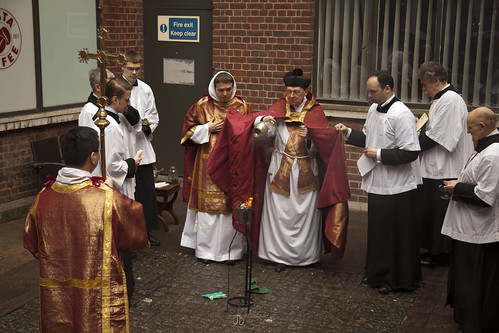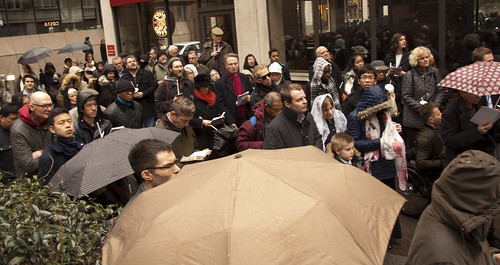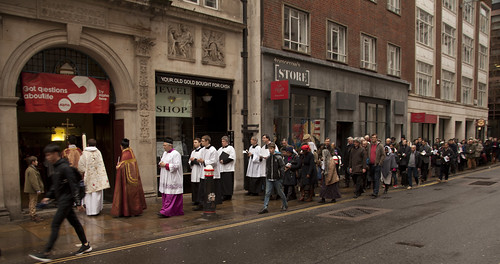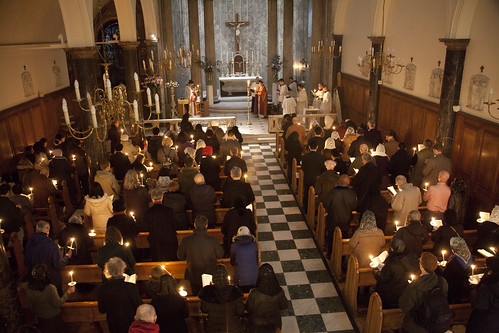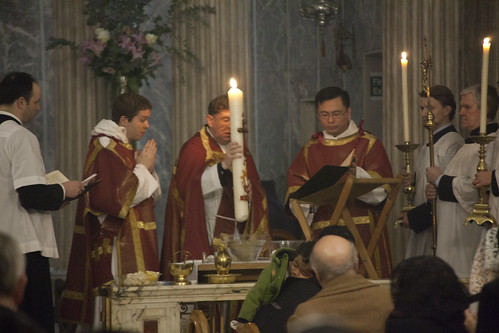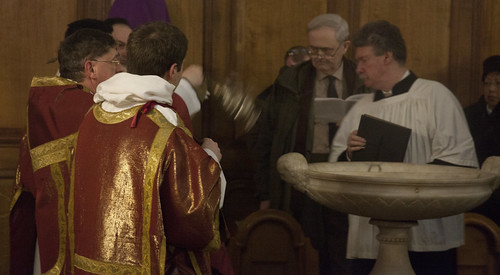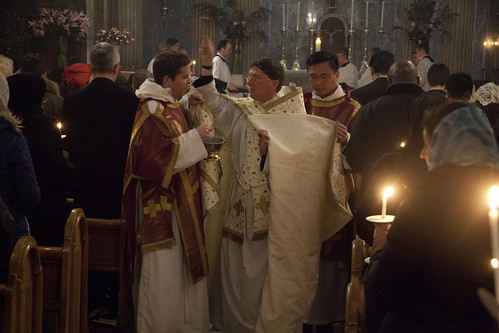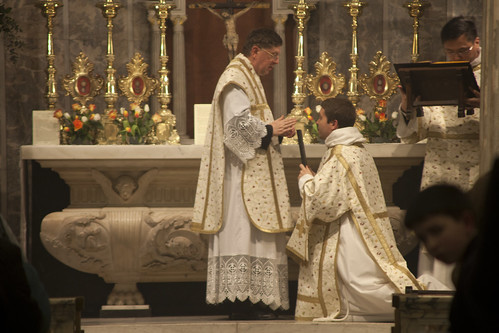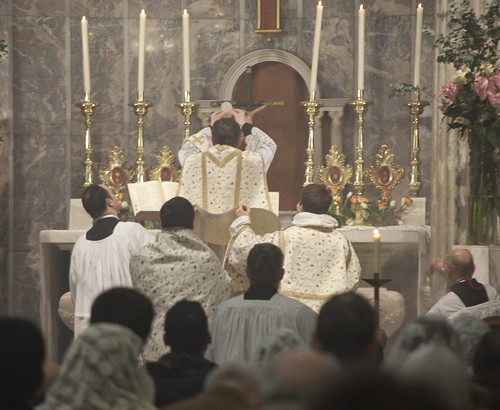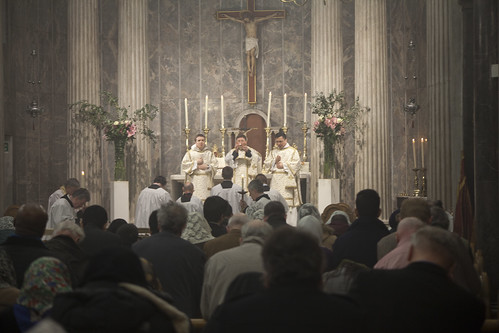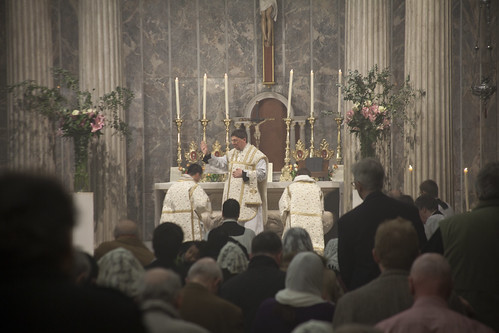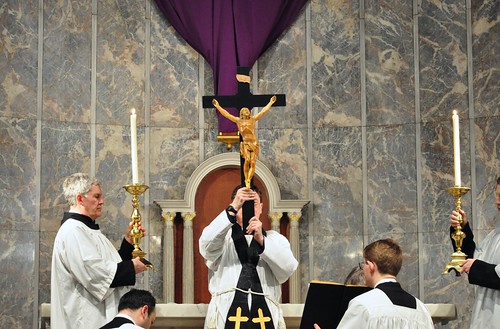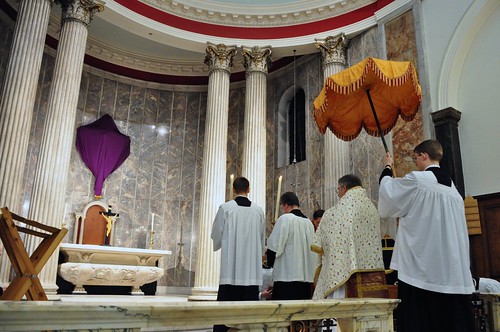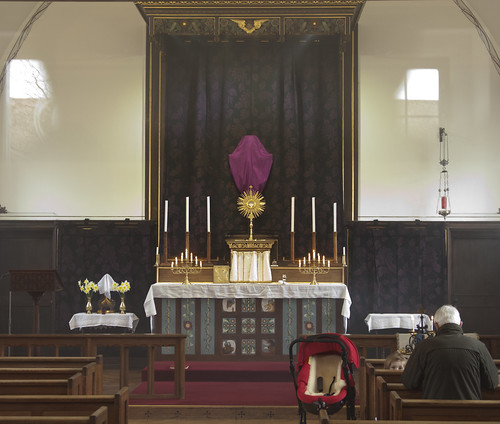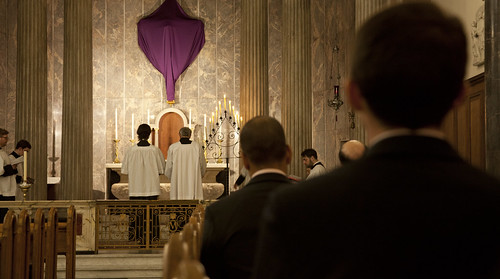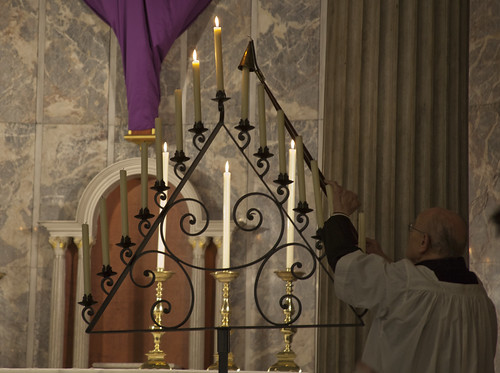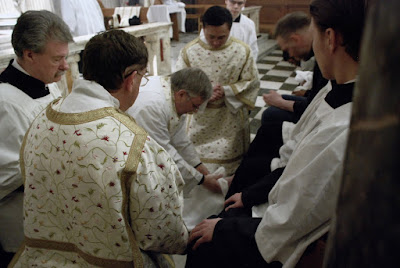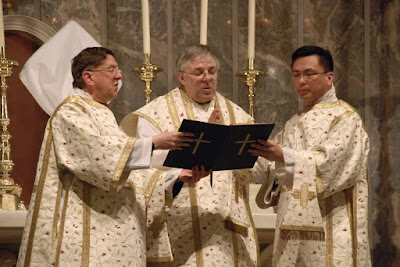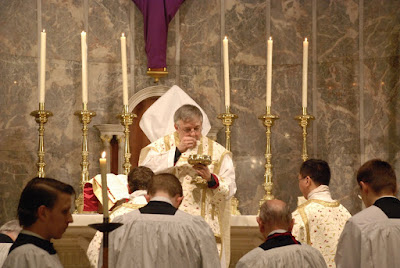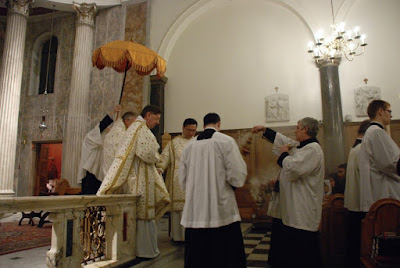Chairman's Blog
Photos of the Easter Vigil at St Mary Moorfields
I was present myself at this and these are my photos. There was a terrific rainstorm halfway through the service, but we managed to get through the Holy Fire part of the service with just a little drizzle.
St Mary Moorfields was packed, which means upwards of 200 people were present.
A big 'thank you' is needed for the clergy, under Fr Michael Cullinan, servers and singers for all the very demanding services of the Easter Triduum: three sets of Tenebrae and the three major services of Holy Thursday, Good Friday, and the Easter Vigil on the Saturday. For these Richard Picket was an expert MC. Matthew Schellhorn with his Cantusy Magnus provided wonderful music for all of them. Our most ambitious set of Triduum services to date was also the most successful and the best attended.
Support the work of the LMS by becoming an 'Anniversary Supporter'.
Photos of Good Friday at St Mary Moorfields
The full set of Good Friday photos here.
It was organised by the Latin Mass Society and celebrated by Fr Michael Cullinan.
Support the work of the LMS by becoming an 'Anniversary Supporter'.
Public Masses at Prior Park during the Priest Training Conference
The chapel at Prior Park is stunning; anyone in the area should take the opportunity of the LMS Priest Training Conference to attend of the public Masses taking place there next week.
Monday 4th April: 5.00pm Solemn Mass of the AnnunciationTuesday 5th April: 11.00am Mass of Vincent FerrerWednesday 6th April: 11.00am Solemn Requiem MassThursday 7th April: 11.00am Solemn Votive Mass of OLJC In addition to these, there will be Vespers and Benediction on Tuesday 5th at 5.00pmSupport the work of the LMS by becoming an 'Anniversary Supporter'.
Recent Photos
Benediction in Passiontide in SS Gregory & Augustine's, Oxford.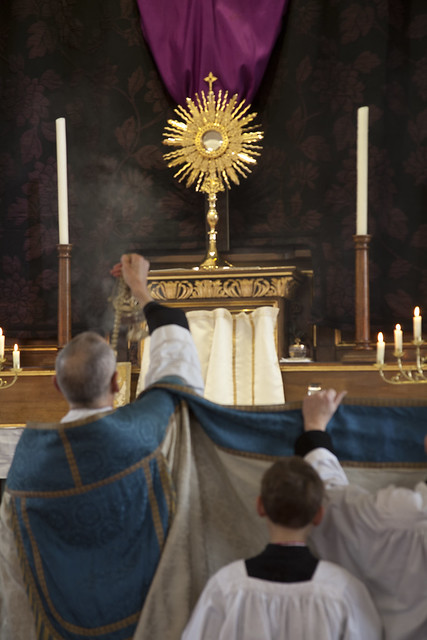
Tenebrae in St Mary Moorfields, on Spy Wednesday. 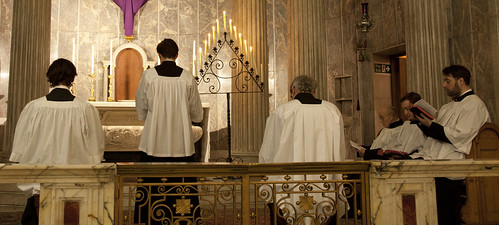
Support the work of the LMS by becoming an 'Anniversary Supporter'.
Surrexit! He is risen.
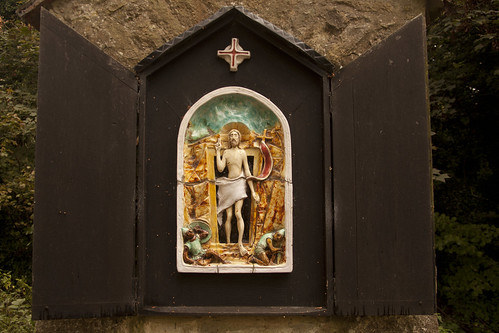 From the Rosary Walk at Aylesford Priory.
From the Rosary Walk at Aylesford Priory.
Happy Easter!
Support the work of the LMS by becoming an 'Anniversary Supporter'.
Maundy Thursday in St Mary Moorfields, London
With Canon Peter Newby, assisted by Fr Michale Cullinan and Fr Cyril Law.
Support the work of the LMS by becoming an 'Anniversary Supporter'.
Stations of the Cross: new short video from the LMS
Support the work of the LMS by becoming an 'Anniversary Supporter'.
Triduum Recess
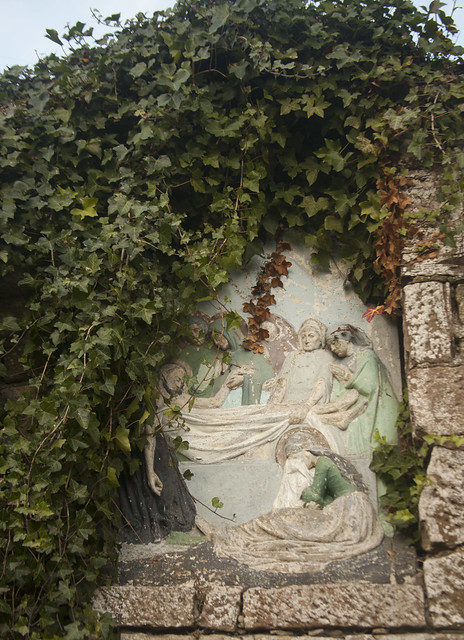 Jesus is laid in the Tomb,From a series of plaques depicting the Seven Sorrows, at Carfin Shrine, near Glasgow.
Jesus is laid in the Tomb,From a series of plaques depicting the Seven Sorrows, at Carfin Shrine, near Glasgow.
Wishing my readers a holy Easter Triduum, and the joy of the Resurrection.
Support the work of the LMS by becoming an 'Anniversary Supporter'.
Guild of St Clare: 'Learn to make a skirt': two-day course 7th May and 11th June
 Children welcome. Sewing at the St Catherine's Trust Summer School, supervised by two
Children welcome. Sewing at the St Catherine's Trust Summer School, supervised by two
Guild of St Clare members.The Guild of St Clare, which is affiliated to the Latin Mass Society, serves the Church by passing on the skills needed for the maintenance, repair, and the making of liturgical vestments. It also aims to promote 'domestic' sewing skills, which should be taken for granted by those undertaking training in emboidery, goldwork and so on. It is astonishing to think that within living memory almost every household had a sewing machine, and women routinely made clothes for themselves and their children. These skills have all but disapeared. Few children today can even thread a needle.
The Guild is pleased to announce a new initiative: a two-day course within which participants will be able to make every aspect of a skirt - and do it properly, and end up with a wearable garment.
In response to popular demand, we are introducing dressmaking workshops under the supervision of our own in-house expert dressmaker, Clare Auty. The first of these will be spread over two days, the 7th May and 11th June, when we will make a lined skirt with a zip and waistband, and the option of pockets which can be embellished.
Continue reading here.
Support the work of the LMS by becoming an 'Anniversary Supporter'.
Reacting to novelties in the Church
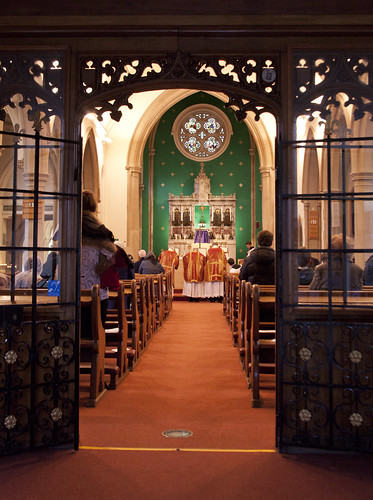 LMS Pilgrimage to Our Lady of Caversham. Come on in.It must be a perennial truth about the Church, that to every issue some people will criticise what you do - whatever it is- as too 'soft', and others as too 'harsh'. Since Vatican II, this has gone from being a parlour game to a major industry, as those who have wanted to maintain the Faith in its integrity cheer themselves up by criticising each other for being either too accommodating of novelties, or too suspicious of them.
LMS Pilgrimage to Our Lady of Caversham. Come on in.It must be a perennial truth about the Church, that to every issue some people will criticise what you do - whatever it is- as too 'soft', and others as too 'harsh'. Since Vatican II, this has gone from being a parlour game to a major industry, as those who have wanted to maintain the Faith in its integrity cheer themselves up by criticising each other for being either too accommodating of novelties, or too suspicious of them.
The 'circular firing squad' this easily becomes is not helpful to the cause, but the question, of how suspicious or accommodating one should be, is an important one and does need to be addressed seriously. Which new initiatives, new theological perspectives, new structures or new forms of worship, are perfectly ok, and which are not? Of the latter, which need to be criticised, where possible evaded (by not using them), or repudiated? Each initiative should in principle be treated on its merits, though the scale of the avalanche of new things since 1960 is itself open to critical assessment.
(Anyone afflicted by the thought 'Anything the Pope says must be ok' should, of course, read my posts about Papolatry, but can still follow the argument in this post by considering examples where the Pope had not actually mandated anything. In a number of cases Popes have condemned novelties, which have still spread through the Church, such as routine use of EMHCs, or General Absolution.)
The difficulty in most cases has been that the problem presented by the new things has been not that they contradict the teaching of the Church in a propositional way - only in seminaries and certain academic institutions have Catholics actually been asked to deny the faith in as many words. Rather, where the old version of whatever it is pointed towards the teaching, the new one points away. They are typically accompanied by official documents which are worded in such a way that they can be read, perhaps with a little effort, in accordance with the Church's teaching, and also read, with a little effort, in accordance with a new view which is not compatible with the teaching of the Church (although this may depend on ignoring some of the document in question).
To avoid tiresome abstractions, let me give an example: Communion in the Hand (CITH). It was allowed, we all know, by Paul VI, though strictly speaking Memoriale Domini was an Instruction of the Congregation of Divine Worship. It is perfectly obvious that CITH points away from the Real Presence. It is, in fact, acknowledged by Memoriale Domini itself, which pleads that the practice be introduced, if at all, only after 'adequte catechesis':
The result of this catechesis should be to remove any suggestion of wavering on the part of the Church in its faith in the eucharistic presence.
By contrast, communion on the tongue evidently points towards the Real Presence: as Pope Benedict expressed it, it marks it with 'an exclamation point'.
That is not to say that CITH is propositionally incompatible with a the Real Presence: heck, it's a practise, not a proposition. And it can be favoured by those who genuinely believe in the Real Presence, on other grounds, though it is notable that these grounds do not derive directly from the teaching of the Church. They might include, for example, an ecumenical motive (to bring the practise of the Catholic Church into line with that of Protestants), a desire to emphasise Christian 'adulthood'; the idea that the traditional practise emphasised the Real Presence at the expense of other features of the liturgy or the Christian life; or that the old practise was just embarrassing.
This kind of thing raises the question: 'How bad does a novelty have to be (how emphatically must is point away from the teaching of the Church), how radically must it infringe normative tradition, on the one hand, and on the other hand how weak must be the arguments in favour of it, and the mandate of legitimate authority in favour of it, for it to be a duty to evade or criticise it?' In many cases, priests are involved in implementing the novelty, so they have a particularly stark version of the question to answer. One thing which is obvious is that there is no simple way to answer such questions. No one can propose a formula for weighing the different considerations against each other, or a scale of seriousness by which the different aspects can be assessed in themselves. Reasonable people, thoughtful people devoted to the good of the Church, will draw the line in different places. It is essential that we recognise that. It is essential that we recognise the good will of those who draw the line in different places than we do ourselves.
This recognition must, however, be carefully distinguished from an attempt to turn the issue into one of personal preferences. A lot of Neo-Cons say things like: 'I personally prefer Latin / Communion on the Tongue / whatever, but I don't criticise those who don't'. If CITH, or whatever it is, was a mistake, it was a mistake for everyone. If it was a good idea, then (certain cultural and historical situations aside), it is good for everyone. In either case, the reasons for and against have got nothing to do with personal tastes. It is a matter of theology, and perhaps of human psychology.
This may be hard for people to do, or for people who aren't used to the kind of disagreement academics engage in, but we have to hold these two things together: I can accept that my opponent on one of these issues is sincere while still maintaining he is objectively wrong. Again, I can maintain that the matter we are discussing is one of objective truth and of great importance, while still respecting the moral integrity of those who disagree with me. Of course, there are positions so extreme or poorly motivated that the integrity of those holding them is called into question, but not all positions except one's own are like that. There is at least a range of options which are not completely unreasonable, and this range is wider than the range which is objectively morally legitimate, and this latter range may well be wider than just one option.
A major source of disagreement on such matters is naturally the weight to assign different factors. No doubt those who accept and even promote CITH do not regard it as as damaging to belief in the Real Presence, as those who criticise CITH. How damaging it is to the faith of ordinary Catholics is an objective question, just one not easy to answer. Suppose it were very damaging, and many Catholics did not realise this, then their acceptance of the practise would be objectively wrong, but it would still be subjectively reasonable. They would not be committing a sin by accepting it, unless their failure to realise how bad it is was itself a result of sin (of negligence, say).
Saying such issues are matters of personal taste trivialises the issues. It also obscures the effect of the novelties on the Church as a community. The novelties affect everyone, even those who do not accept them (in this case, those who go on receiving on the tongue), because it affects the general tone and atmosphere, what actions are regarded as normal and what as eccentric or singular, and of course it affects people's beliefs. If the congregation in my local Church, or the parents involved in my local Catholic school, weaken in their faith, this is a problem for me. I can't just pretend nothing has happened, and carry on as normal.
This is clearly true also for attitudes to marriage. Already we have a situation when most parents sending their children to a Catholic school accept same-sex marriage, contraception, cohabitation, and remarriage after divorce, without annulment. Things have got so bad, in fact, that it is regarded as the height of straitlaced orthodoxy, to say of a case of institutionalised adultery, 'well, let's hope that they can get an annulment', as if the only correct view to take of a sinful lifestyle is to close our eyes and imagine, without any particular justification, that for obscure reasons it may not be as bad as it looks. A lot of things the Church has done at the institutional level, a lot of post 1960s novelties, have contributed to this collapse of the Faith by 'pointing away' from the Faith. The weakening of the Church's official opposition to civil divorce, and to mixed marriages for Catholics; the failure to preach against contraception; and a widespread collapse of discipline over who can receive Communion, or be involved in Church activities.
It is unimaginable that Pope Francis is going to reverse this trend when he publishes the Post-Synodal Exhortation. The only question is how far he will go in accommodating the Church still further to secular attitudes, thereby reinforcing them within the bosom of the Church. There has been little, if anything, lay Catholics or ordinary priests have been able to do to manifest a rejection or criticism of the policies which have led us to this pass, when those policies have been a matter of changes to Canon Law, to catechetical textbooks, or to Bishops' statements on forthcoming civil legislation. As far preaching about contraception, and refusing Communion to public sinners, the pressure on priests not to do such things has been intense, and there has been little lay Catholics could do to assist them.
Developments in the future may make it harder, or in some ways easier, to criticise novelties, but how it can be done depends, as I keep saying on this blog, on the precise form they take. On the recent change to Canon Law procedure, the accelerated process for annulments, the matter is in the hands of bishops. I doubt that it would be justified for individual priests to deny the Marriage Rite or Communion to a couple who had had a 'quickie annulment', and they'd be for the high jump if they tried it. What can lay Catholics do about it? Write blog posts, I suppose.
Over the last fifty years, resistance to novelties has coalesced into the movement in favour of the Traditional Catholic liturgy. Not all novelties, of course, have been liturgical, but one's ability to make a critical assessment of any of them is crippled if one is ideologically committed to a huge number of liturgical ones. This movement has provided a home, a friendly environment and a source of moral support, for both clergy and laity uncomfortable with a wide range of novelties. It is to this movement, in my view, that we must look for any kind of sustained, collective resistance, to the next things coming down the road.
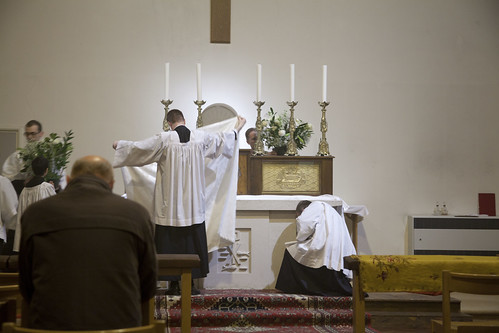 The Stripping of the Altar, at the end of Mass on Maundy Thursday.Support the work of the LMS by becoming an 'Anniversary Supporter'.
The Stripping of the Altar, at the end of Mass on Maundy Thursday.Support the work of the LMS by becoming an 'Anniversary Supporter'.

